暑期复习新版7AU5-6知识点
七年级上Units5、6、7、8复习要点

一、牢记单元单词及短语want to do something 想要做某事want to eat chicken 想要吃鸡肉some of my family photos 我的一些家庭照have an egg (a hamburger) 吃个鸡蛋(一个汉堡包)its name 它的名字have some chicken for dinner 吃一些鸡肉作晚餐lots of healthy food 大量健康食品play volleyball 打排球watch TV 看电视two basketballs and three baseballs 两个篮球和三个棒球play sports 做运动watch sports on TV 在电视上看体育运动二、用适当的词填空1. She __________ (have) a small sports collection .2. I ____________ (have ) a new school bag.3. It is _____________ (boring, interesting) to play tennis, I like it very much.4. The book is ___________(boring, interesting), I don’t like it.5. Tony likes sports,______________ (and, but )he doesn’t like watching TV.6. Do you want to play baseball with _______________ (我们)?7. __________ your father _______ (eat) salad?8. Do your like ______________ (tomato)?9. I ________ (have) ice cream in summer(夏天),but my sister _________ (have) salad.My brother _______________ (not have ) ice cream in summer.10. Mike likes ice cream for ____________ (fruits, desert).11. Does he have French fries ___________(填恰当的介词) dinner?12. Joan and I ___________ (be) good friends.13. We __________ (have, has) a great sports collection.14. John ___________ (have , has ) five ping-pong balls.15. You have a new pen, I have a new pen, _____________ . (to, too, two)16. I like sports, and I often _____________ (观看) them on TV.三、句型转换。
七年级 unit5-6知识点 教案

教学过程一、复习预习可数名词和不可数名词二、知识讲解与例题精析Unit 5 Do you hane a soccer ball ?(第一块)一、一般现在时态1、一般现在时态的概念(1)、表示现在的状态(谓语多用系动词be)(2)、表示经常或习惯性的动作(谓语是do类动词)(3)、表示主语具备的性格和能力(谓语多是speak like enjoy)2、be (am is are)“是”,英语中最重要的一个系动词。
do类动词,又叫实义动词。
例如:have (有),play(玩,打)等。
3、一般现在时态的动词形式一般现在时态规定:系动词be用现在式am is are 三个形式。
do 类动词用原型或第三人称单数形式。
“原形动词+ s / es”构成“第三人称单数形式”,与单数名词变复数名词方法一样。
(1)、一般情况,动词后直接加s (清辅音后读/ s /, 浊辅音后度/ z /)例如:brings 带来calls 打电话meets 遇见needs 需要(2)、以字母e结尾的动词,直接加s (读/ z /)例如:Likes 喜欢takes 带走(3)、以字母s x ch sh o结尾的动词,加es (读/ z / 或/ Iz/ )例如:does 做goes 走,去watches 观看(4)、以“辅音字母+ y”结尾的名词,变y为i,加es (读/ z /)例如:stud y →studies 学习(思考:enjoy play have的第三人称单数形式是)4 、一般现在时态主语与谓语动词的搭配第一人称单数主语:I +am 或V原形he she itthis that第三人称单数主语单数名词不可数名词+ is ; V单三形式动词不定式动名词We you they复数主语these those + are ; V原形复数名词本块习题:用所给词的正确形式填空1、I _______ ( have ) a soccer ball .2、She ______ ( have ) two __________ ( pingpong—ball ) .3、He ______ ( play ) sports every day .4、We ______ ( speak ) English .5、Tom ______ ( call ) Jim every day .6、My daughter ______ ( like ) apples .7、His ______ ( friend ) knows English .8、The girl ______ ( study ) English sometimes .9、The _______ ( boy ) often watch TV .10、Her uncle ______ ( go ) home on foot 。
七年级下册U5-U6各个话题知识要点

七年级下册U5-U6各个话题知识要点(重点句型必须背下来)Unit 5 Topic1重点语法一般现在时(常与频度副词never, seldom, sometimes, often, usually, always等连用)重点句型1.How do you usually come to school? 你通常是怎样来上学的?2.I usually come to school by subway. 我通常是乘地铁来上学。
3.How often do you go to the library? 你多久去一次图书馆?4.Once/Twice/Three times a week/Very often/Every day/Sedom5.一周一次/两次/三次经常/每天/很少。
6.Happy New Year! 新年快乐!7.The same to you. 你也一样。
8.The early bird catches the worm. 早起的鸟儿有虫吃。
9.Nice talking to you. 和你交谈很愉快!10.Work must come first! 工作必须放在第一位!11.She goes to bed at about a quarter to ten. 她大约在9点45睡觉。
重点详解1I always go to school by bus.by+交通工具名称,表示使用某种交通方式,中间不加限定词,如果交通工具前有a, the, my 等限定词,就不能用by,而是用in或是on.on the train=by train on his bike=by bike in my car=by car.巧辩异同on foot 与walk on foot “走路”,是介词短语,不能作谓语,只作方式状语,位于句末。
walk “走路”,是动词,可以作谓语。
go to…on foot= walk to I often go to school on foot. =I often walk to school.同样,go to….by bike = ride a bike to go to…. by car = drive a car to go t o … by plane = fly to go to… by bus = take a bus to2 Come on! It’s time for class. come on “快点,加油,来吧”。
2022学年人教版七年级英语上册unit5---6复习知识点汇总
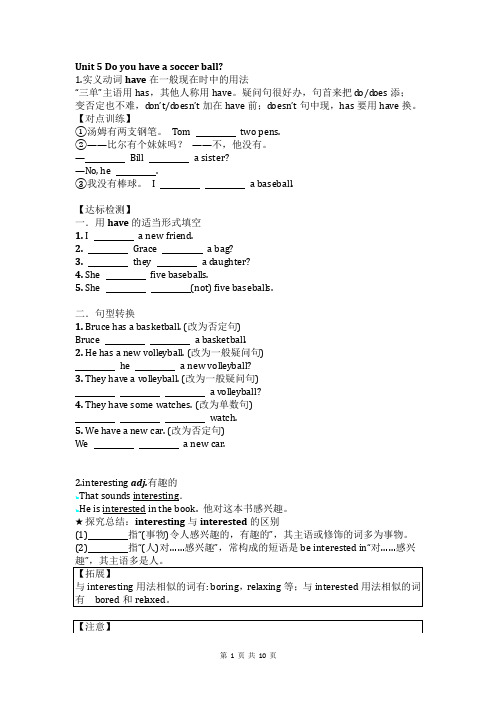
Unit 5 Do you have a soccer ball?1.实义动词have在一般现在时中的用法“三单”主语用has,其他人称用have。
疑问句很好办,句首来把d o/d oes添;变否定也不难,d on’t/doesn’t加在have前;d oesn’t句中现,has要用have换。
【对点训练】①汤姆有两支钢笔。
Tom two pens.②——比尔有个妹妹吗?——不,他没有。
—Bill a sister?—No, he .③我没有棒球。
I a baseball.【达标检测】一.用have的适当形式填空1. I a new friend.2.Grace a bag?3.they a daughter?4. She five baseballs.5. She (not) five baseballs.二.句型转换1. Bruce has a basketball. (改为否定句)Bruce a basketball.2. He has a new voll eyball. (改为一般疑问句)he a new voll eyball?3. They have a voll eyball. (改为一般疑问句)a voll eyball?4. They have some watches. (改为单数句)watch.5. We have a new car. (改为否定句)We a new car.2.interesting adj.有趣的That sounds interesting.He is interested in the book. 他对这本书感兴趣。
★探究总结:interesting与interested的区别(1) 指“(事物)令人感兴趣的,有趣的”,其主语或修饰的词多为事物。
(2) 指“(人)对……感兴趣”,常构成的短语是be interested in“对……感兴interesting 是以元音音素开头的单词,所以当它修饰可数名词的单数时,前面用不定冠词an 。
七年级英语期末复习(7A Unit 5~Unit 6)
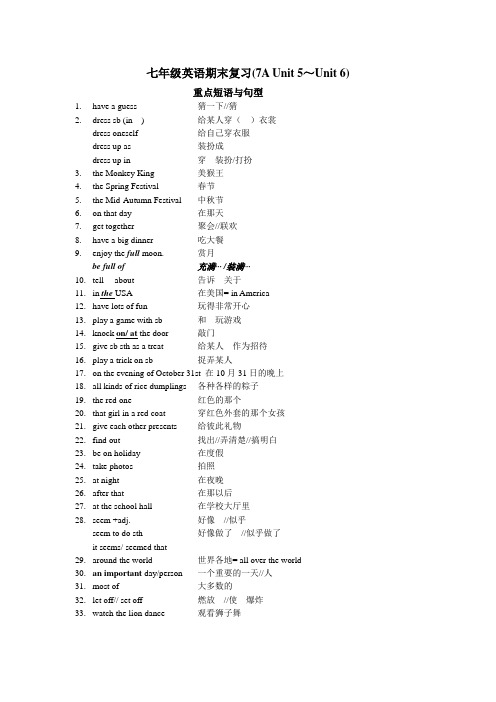
七年级英语期末复习(7A Unit 5~Unit 6)重点短语与句型1.have a guess 猜一下//猜2.dress sb (in···) 给某人穿(···)衣裳dress oneself 给自己穿衣服dress up as 装扮成···dress up in 穿···装扮/打扮3.the Monkey King 美猴王4.the Spring Festival 春节5.the Mid-Autumn Festival 中秋节6.on that day 在那天7.get together 聚会//联欢8.have a big dinner 吃大餐9.enjoy the full moon. 赏月be full of 充满··· /装满···10.tell ···about···告诉···关于···11.in the USA 在美国= in America12.have lots of fun 玩得非常开心13.play a game with sb 和···玩游戏14.knock on/ at the door 敲门15.give sb sth as a treat 给某人···作为招待16.play a trick on sb 捉弄某人17.on the evening of October 31st 在10月31日的晚上18.all kinds of rice dumplings 各种各样的粽子19.the red one 红色的那个20.that girl in a red coat 穿红色外套的那个女孩21.give each other presents 给彼此礼物22.find out 找出//弄清楚//搞明白23.be on holiday 在度假24.take photos 拍照25.at night 在夜晚26.after that 在那以后27.at the school hall 在学校大厅里28.seem +adj. 好像···//似乎···seem to do sth 好像做了···//似乎做了··it seems/ seemed that ···29.around the world 世界各地= all over the world30.an important day/person 一个重要的一天//人31.most of ···大多数的···32.let off// set off 燃放···//使···爆炸33.watch the lion dance 观看狮子舞Important sentences:1)Let's celebrate! 让我们庆祝吧2)How about the Monkey King? (装扮成)美猴王怎么样?3)What is your favourite festival? 你最喜欢的节日是什么?4)It's great! 真棒!5)Thank you for telling me about the Mid-Autumn Festival.谢谢你告诉我有关中秋节的事6)I like Halloween best. 我最喜欢万圣节前夕7)What do you do on/ at Halloween.在万圣节前夕你做什么?8)Which (one) would you like? 你想要哪一个?9)Who is Mr Wu? 谁是吴老师?10)Whose bag is this? 这是谁的包?11)When is your birthday? 什么时候是你的生日?12)Where is my pen? 我的笔在哪?13)Why are you happy? 你为什么开心?14)How do you get to school? 你怎样去学校?15)What do you have for lunch? 你午餐吃什么?16)What does he want for Christmas/his birthday? 圣诞节/生日时他想要什么?17)Happy new year!---The same to you! 新年快乐//18)What do you do to celebrate the Chinese New Year in Beijing? 你在北京做什么来庆祝春节19)You seem very happy! 你似乎很开心20)Have a nice day! 度过美好一天Grammar: the usage of "how"How对by bus/car/bike/train/plane ,on foot, take a bus ,walk, ride等方式提问。
沪教版英语7A u5-U6单元总结
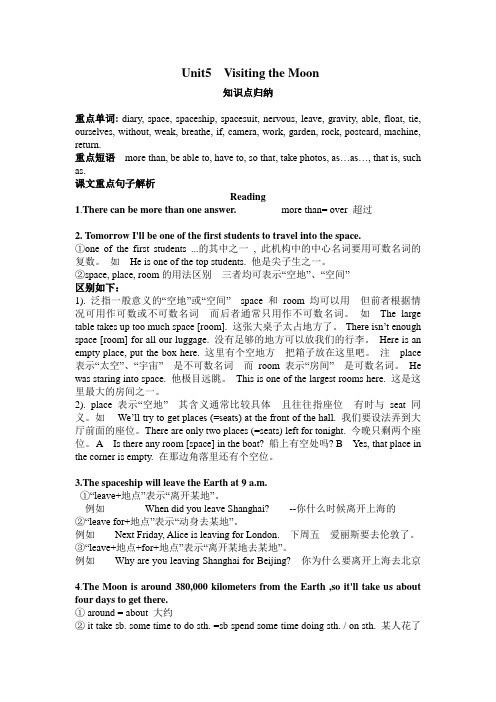
Unit5 Visiting the Moon知识点归纳重点单词: diary, space, spaceship, spacesuit, nervous, leave, gravity, able, float, tie, ourselves, without, weak, breathe, if, camera, work, garden, rock, postcard, machine, return.重点短语, take photos, as…as…, that is, such as.课文重点句子解析Reading1.There can be more than one answer. more than= over 超过2. Tomorrow I'll be one of the first students to travel into the space.①one of the first students ...的其中之一, 此机构中的中心名词要用可数名词的复数。
如他是尖子生之一。
②space, place, room的用法区别三者均可表示“空地”、“空间区别如下:1). 泛指一般意义的“空地”或“空间和room 均可以用但前者根据情况可用作可数或不可数名词而后者通常只用作不可数名词。
如takes up too much space [room]. 这张大桌子太占地方了。
There isn’t enough space [room] for all our luggage. 没有足够的地方可以放我们的行李。
Here is an empty place, put the box here. 这里有个空地方把箱子放在这里吧。
注表示“太空”、“宇宙是不可数名词而room 表示“房间是可数名词。
He was staring into space. 他极目远眺。
This is one of the largest rooms here. 这是这里最大的房间之一。
七年级英语上册Unit5-6重点、考点知识总结
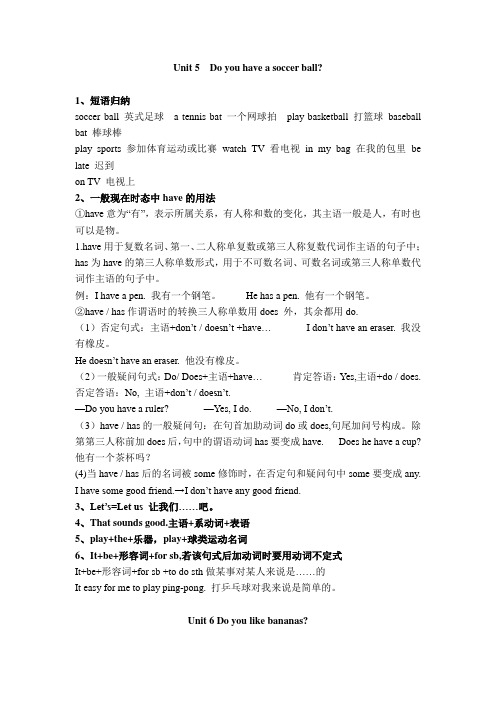
Unit 5 Do you have a soccer ball?1、短语归纳soccer ball 英式足球 a tennis bat 一个网球拍play basketball 打篮球baseball bat 棒球棒play sports 参加体育运动或比赛watch TV 看电视in my bag 在我的包里be late 迟到on TV 电视上2、一般现在时态中have的用法①have意为“有”,表示所属关系,有人称和数的变化,其主语一般是人,有时也可以是物。
1.have用于复数名词、第一、二人称单复数或第三人称复数代词作主语的句子中;has为have的第三人称单数形式,用于不可数名词、可数名词或第三人称单数代词作主语的句子中。
例:I have a pen. 我有一个钢笔。
He has a pen. 他有一个钢笔。
②have / has作谓语时的转换三人称单数用does 外,其余都用do.(1)否定句式:主语+don’t / doesn’t +have… I don’t have an eraser. 我没有橡皮。
He doesn’t have an eraser. 他没有橡皮。
(2)一般疑问句式:Do/ Does+主语+have… 肯定答语:Yes,主语+do / does. 否定答语:No, 主语+don’t / doesn’t.—Do you have a ruler? —Yes, I do. —No, I don’t.(3)have / has的一般疑问句:在句首加助动词do或does,句尾加问号构成。
除第第三人称前加does后,句中的谓语动词has要变成have. Does he have a cup? 他有一个茶杯吗?(4)当have / has后的名词被some修饰时,在否定句和疑问句中some要变成any.I have some good friend.→I don’t have any good friend.3、Let’s=Let us 让我们……吧。
牛津英语7A U5,U6的知识点复习1

明思教育牛津英语7A Unit 5 基础训练一、重点词组1. 稍等一会儿_____________________2. …上有折扣_____________________3. 宁愿做某事_____________________4. 与…很相配_____________________5. 有足够的钱_____________________6. 不要紧,没关系_____________________二、句型结构1. How much do the cards cost? (How much 表示对价格的提问)1) 这本书多少钱_________ __________ is the book?/ How much ____ the book _______?2) 这些贴画很贵。
These stickers are very __________ / __________.These stickers cost too __________. The price of these stickers are very _________.2. I don’t have enough money to buy her a CD. (enough的用法)1) 他有足够的时间去完成这项工作。
He has __________ __________ to finish the work.2) 他足够高去拿到书架上的书。
He is _________ __________ to reach the book on the shelf.3) 他跑得足够快没人能赶上他。
He runs _____ ________, so nobody can catch up with him.三、难点语法1. ‘there is ’ / ‘there are ’句型的用法我们用‘there is ’ / ‘there are ’句型来介绍新东西。
初中英语七年级下册Units 5-6知识汇总
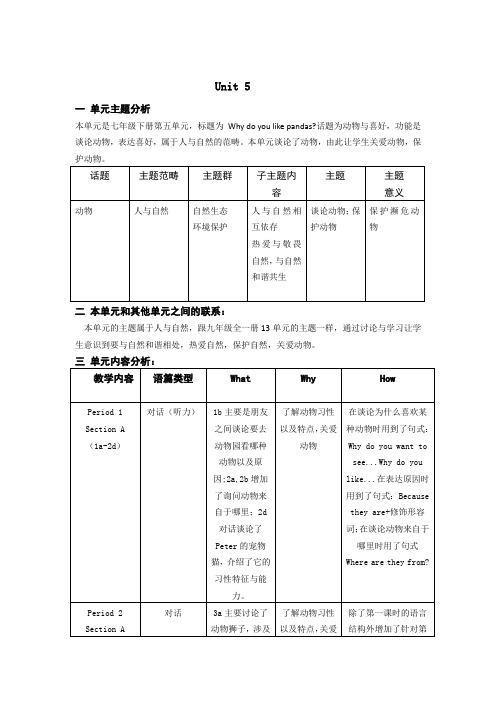
Unit 5一单元主题分析本单元是七年级下册第五单元,标题为Why do you like pandas?话题为动物与喜好,功能是谈论动物,表达喜好,属于人与自然的范畴。
本单元谈论了动物,由此让学生关爱动物,保护动物。
二本单元和其他单元之间的联系:本单元的主题属于人与自然,跟九年级全一册13单元的主题一样,通过讨论与学习让学生意识到要与自然和谐相处,热爱自然,保护自然,关爱动物。
四单元教学目标:1.能够掌握一些动物名词、描述性词语。
2.通过看、听、说等方式学习如何谈论动物,能用目标语言谈论对动物的喜好以及原因。
3.了解动物习性、特点、现状等,意识到动物是人类的朋友,应该与动物和谐相处,关爱动物,保护动物。
4.感受文化多样性,增加国家认同感。
Unit 6一、单元主题分析本单元是七年级下册第六单元,标题为I’m watching TV,话题为“日常活动”,功能是用现在进行时谈论人们的日常活动。
属于人与自我、人与社会的范畴。
本单元从日常打电话形式展开对话,通过现在进行时的各种句式结构来讨论人们的日常活动,使学生能够合理规划自己的日常活动,并能针对活动表达自己的看法,提出合理的建二本单元和其他单元之间的联系:在话题上,八年级上册第二单元也是谈论活动,本单元的学习为后面的学习打下了良好的基础。
在语法上本单元是初中阶段第一次接触现在进行时,因此它对学生第七单元的学习至关重要,同时对于八下第五单元过去进行时的学习做好了铺垫。
四单元教学目标:1.多角度谈论日常活动,针对不同的日常活动表达自己的看法并提出相应的建议。
2.基于不同场景,讨论各种日常活动,运用现在进行时以及电话交流用语进行提问与回答。
3.理解并掌握现在进行时在新闻报道中的运用,领略中西方文化习俗的差异。
7AU6知识点梳理
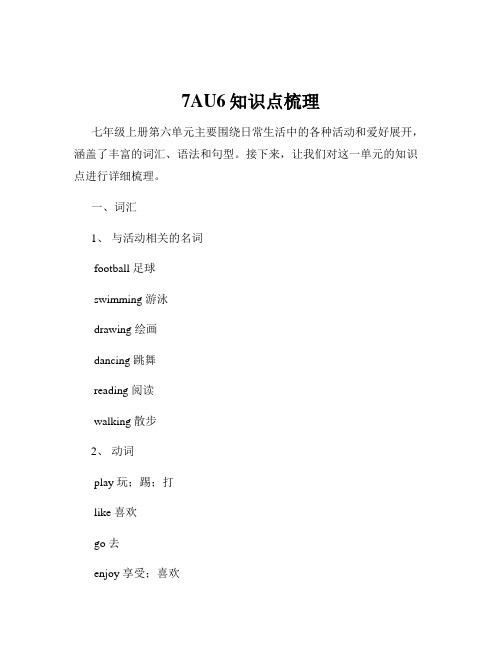
7AU6知识点梳理七年级上册第六单元主要围绕日常生活中的各种活动和爱好展开,涵盖了丰富的词汇、语法和句型。
接下来,让我们对这一单元的知识点进行详细梳理。
一、词汇1、与活动相关的名词football 足球swimming 游泳drawing 绘画dancing 跳舞reading 阅读walking 散步2、动词play 玩;踢;打like 喜欢go 去enjoy 享受;喜欢3、形容词great 好极的;美妙的fun 有趣的4、其他often 经常sometimes 有时二、语法1、一般现在时表示经常发生的动作或存在的状态。
主语+动词原形/动词第三人称单数形式例如:I often play football He likes swimming注意动词第三人称单数形式的变化规则,一般在动词后加 s 或 es。
2、行为动词的一般疑问句及回答Do +主语+动词原形+其他?回答:Yes, 主语+ do / No, 主语+ don'tDoes +主语(第三人称单数)+动词原形+其他?回答:Yes, 主语+ does / No, 主语+ doesn't例如:Do you like reading? Yes, I do / No, I don'tDoes he go walking sometimes? Yes, he does / No, he doesn't3、频率副词often 经常, usually 通常, sometimes 有时, never 从不频率副词通常放在实义动词之前, be 动词、助动词、情态动词之后。
三、句型1、 I like playing football (表达喜欢做某事)2、 She enjoys dancing (enjoy + doing sth 喜欢做某事)3、Do you often go swimming? (一般疑问句询问是否经常做某事)4、 He doesn't like drawing (否定句)四、重点短语1、 play football / basketball 踢足球/打篮球2、 go swimming 去游泳3、 read books 看书4、 walk to school 步行去上学五、语言运用在实际交流中,能够运用本单元所学的词汇、语法和句型来谈论自己和他人的爱好及日常活动。
牛津译林版七年级英语上册7A Unit5-6知识点归纳总结
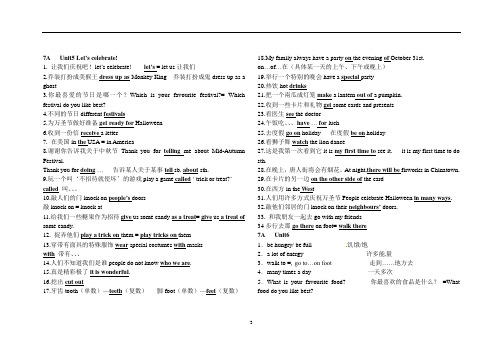
7A Unit5 Let’s celebrate!1. 让我们庆祝吧!let’s celebrate! let’s = let us让我们2.乔装打扮成美猴王dress up as Monkey King 乔装打扮成鬼dress up as a ghost3.你最喜爱的节日是哪一个?Which is your favourite festival?= Which festival do you like best?4.不同的节日different festivals5.为万圣节做好准备get ready for Halloween6.收到一份信receive a letter7. 在美国in the USA = in America8.谢谢你告诉我关于中秋节Thank you for telling me about Mid-Autumn Festival.Thank you for doing…告诉某人关于某事tell sb. about sth.9.玩一个叫‘不招待就使坏’的游戏play a game called‘ trick or treat?’called叫、、、10.敲人们的门knock on people’s doors敲knock on = knock at11.给我们一些糖果作为招待give us some candy as a treat= give us a treat of some candy.12. 捉弄他们play a trick on them = play tricks on them13.穿带有面具的特殊服饰wear special costumes with maskswith带有、、、14.人们不知道我们是谁people do not know who we are.15.真是精彩极了it is wonderful.16.挖出cut out17.牙齿tooth(单数)—teeth(复数)脚foot(单数)—feet(复数)18.My family always have a party on the evening of October 31st. on…of…在(具体某一天的上午、下午或晚上)19.举行一个特别的晚会have a special party20.热饮hot drinks21.把一个南瓜成灯笼make a lantern out of a pumpkin.22.收到一些卡片和礼物get some cards and presents23.看医生see the doctor24.午饭吃、、、have… for luch25.去度假go on holiday 在度假be on holiday26.看狮子舞watch the lion dance27.这是我第一次看到它it is my first time to see it. it is my first time to do sth.28.在晚上,唐人街将会有烟花。
苏教版中考英语复习各单元要点7A U5
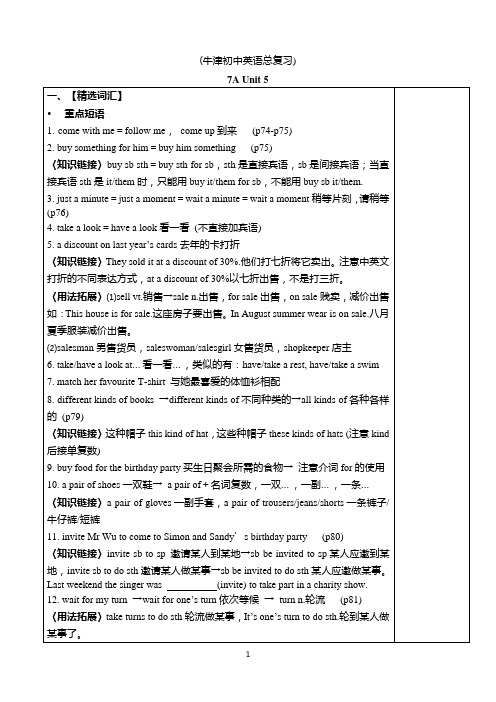
4. take a look=have a look看一看(不直接加宾语)
5. a discount on last year’s cards去年的卡打折
〈知识链接〉They sold it at a discount of 30%.他们打七折将它卖出。注意中英文打折的不同表达方式,at a discount of 30%以七折出售,不是打三折。
〈知识链接〉I’m sure sb will/can do sth.=Sb am/is/are sure to do sth.某人一定能做某事。
如:I’m sure he will win the final match.=He is sure to win the final match.
8. I don’t have enough money to buy her a CD then.
6. take/have a look at…看一看…,类似的有:have/take a rest, have/take a swim
7. match her favourite T-shirt与她最喜爱的体恤衫相配
8. different kinds of books→different kinds of不同种类的→all kinds of各种各样的(p79)
4. bus stop公交站台,taxi rank出租车停靠站
二、【重点句型】
1. Do you have any good ideas?=Do you have a good idea?你有好主意吗?(p75)
〈知识链接〉Do you have any+名词复数?Do you have a/an+名词单数?
外研版七年级英语下册module5-6知识点及练习精选全文完整版
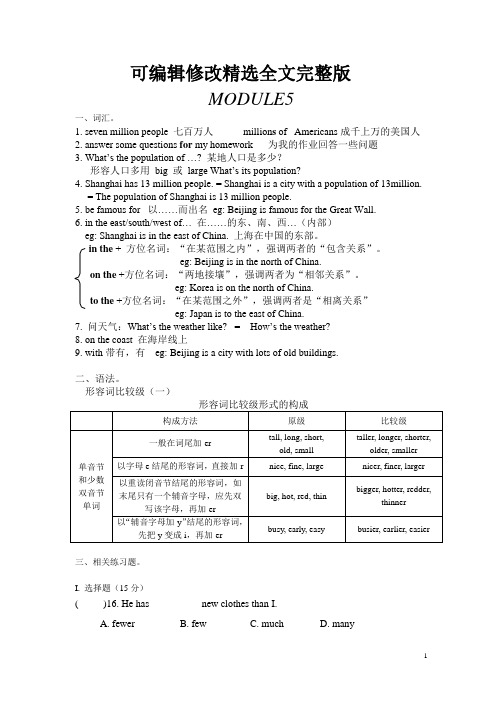
可编辑修改精选全文完整版MODULE5一、词汇。
1. seven million people 七百万人million s of Americans成千上万的美国人2. answer some questions for my homework 为我的作业回答一些问题3. What’s the population of …? 某地人口是多少?形容人口多用big 或large What’s its population?4. Shanghai has 13 million people. = Shanghai is a city with a population of 13million.= The population of Shanghai is 13 million people.5. be famous for 以……而出名eg: Beijing is famous for the Great Wall.6. in the east/south/west of… 在……的东、南、西…(内部)eg: Shanghai is in the east of China. 上海在中国的东部。
in the + 方位名词:“在某范围之内”,强调两者的“包含关系”。
eg: Beijing is in the north of China.on the +方位名词:“两地接壤”,强调两者为“相邻关系”。
eg: Korea is on the north of China.to the +方位名词:“在某范围之外”,强调两者是“相离关系”eg: Japan is to the east of China.7. 问天气:What’s the weather like?= How’s the weather?8. on the coast 在海岸线上9. with带有,有 eg: Beijing is a city with lots of old buildings.二、语法。
人教版七年级上册知识点总结unit5-unit6 (24张)
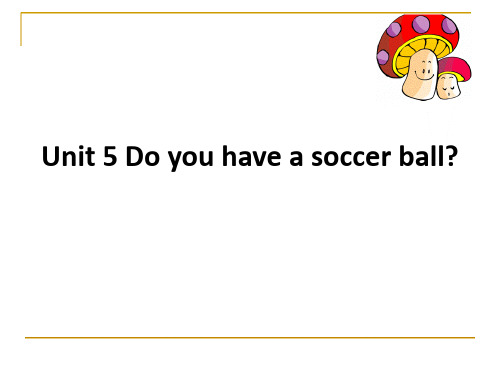
• 名词复数变化规则: • 1.一般在词尾加-s。
• book→books bag→bags • 2.以s,x, ch, sh结尾的名词,一般在词尾加-
要变成have. • I don’t have an eraser. 我没有橡皮。 • He doesn’t have an eraser. 他没有橡皮。
Does he have a cup? 他有一个茶杯吗? • (2)一般疑问句式:Do/ Does+主语+have…
• 3.Let’s=Let us 让我们……吧。 • 肯定答语:Yes,主语+do / does. • 否定答语:No, 主语+don’t / doesn’t.
• 三.典句必背
• 1. I like hamburgers. 我喜欢汉堡包。 • 2. He likes ice-cream. 他喜欢冰激凌。 • 3. —Do you like salad? 你喜欢沙拉吗? • — Yes, I do. / No, I don’t. 是的,我喜欢./ 不,
我不喜欢。
Unit 5 Do you have a soccer ball?
• 知识点: • 1.短语归纳: • soccer ball 英式足球 • a tennis bat 一个网球拍 • play basketball 打篮球 • baseball bat 棒球棒 • play sports 参加体育运动或比赛 • watch TV 看电视 • in my bag 在我的包里 • be late 迟到 • on TV 电视上
人教版七年级下册 Unit 5 --6知识点(适合于听写 学生对照背诵)-带答案

1.友好的2.羞怯的3.救4.象征5.旗帜6.忘记7.迷路8.地点9.水10.危险11.处于(极大)危险之中12.砍13.向下14.砍倒15.树16.杀死17.象牙18.超过19.由...制成20.泰国21.泰国人1.睡觉 2.猫 3.腿4.宠物5.南非6.非洲7.南方的8.澳大利亚9.稍微10.种类11.吓人的12.美丽的13.聪明的14.懒散的15.可爱的16.动物17.长颈鹿18.狮子19.考拉20.大象21.老虎22.动物园23.熊猫24.有点儿(2种)25.她有点儿害羞。
26.一种(of)27.不同种类的28.许多种29.对某人和蔼可亲的30.你在英语方面帮助我真是太好了。
(of)31.她来自于南非(2种)。
改为一般疑问句,并做出2种回答。
32.让某人做某事(2种)33.我的家庭是一个大家庭。
34.她的家人正在看电视。
35.整天36.倒立37.为什么不出去呢?38.他们来自于哪里?(2种)39.一本有趣的故事书40.你想吃点别的什么吗?41.一只可爱的宠物42.在那边43.距离...(不)远44.挽救某人的生命45.说出save的其他含义46.他们中的一个善于英语。
47.我的一个学生擅长于地理。
48.戒指是爱情的象征。
49.我忘记告诉你了。
50.我忘记我已经告诉过你关于它了。
51.长时间行走52.迷路(3种)53.写出with的4种含义54.危险(n.)---(adj.)55.脱离危险56.杯子里有一些水。
57.砍倒他们58.砍倒树(2种)59.我爸爸五十多岁了。
60.一只5岁的熊猫61.这只熊猫5岁了。
62.我是中国人。
63.我是中国女孩。
64.我从来都不开心。
(fun)65.纸是由树木制成。
66.书是由纸构成。
67.为了。
而杀。
68.公园是好玩的地方。
69.你不爱我了吗?爱。
70.我们必须做一些事情去挽救他们。
71.踢足球和猫玩耍97.你想和我一起外出吗?(使用would,肯定回答)98.你认为。
7AU6知识点梳理
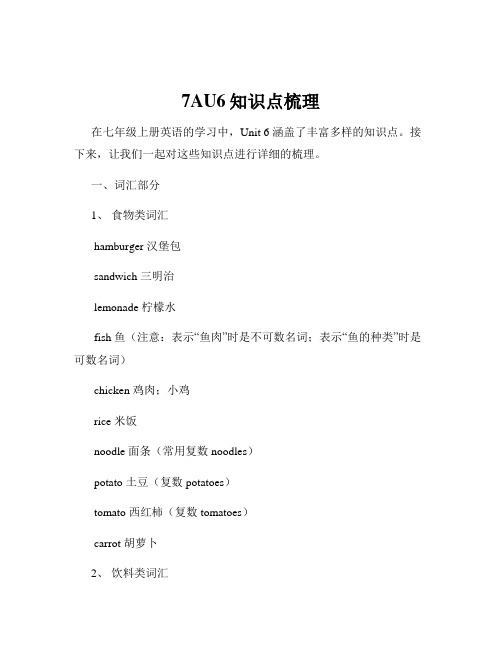
7AU6知识点梳理在七年级上册英语的学习中,Unit 6 涵盖了丰富多样的知识点。
接下来,让我们一起对这些知识点进行详细的梳理。
一、词汇部分1、食物类词汇hamburger 汉堡包sandwich 三明治lemonade 柠檬水fish 鱼(注意:表示“鱼肉”时是不可数名词;表示“鱼的种类”时是可数名词)chicken 鸡肉;小鸡rice 米饭noodle 面条(常用复数 noodles)potato 土豆(复数 potatoes)tomato 西红柿(复数 tomatoes)carrot 胡萝卜2、饮料类词汇cola 可乐coffee 咖啡tea 茶juice 果汁3、形容词healthy 健康的unhealthy 不健康的delicious 美味的4、动词like 喜欢dislike 不喜欢二、语法部分1、一般现在时一般现在时表示经常发生的动作或存在的状态。
当主语是第三人称单数时,动词要用第三人称单数形式。
例如:He likes hamburgers (like 变为 likes)常见的第三人称单数主语有:he, she, it 以及单个的人名、地名、事物名称等。
2、可数名词与不可数名词可数名词有复数形式,如:apples, bananas 等。
不可数名词没有复数形式,如:water, milk 等。
区分可数与不可数名词的方法:物质名词一般是不可数的,如:air, water 等。
个体名词一般是可数的,如:student, book 等。
3、频率副词always 总是usually 通常often 经常sometimes 有时never 从不频率副词在句中的位置通常在实义动词之前,be 动词、助动词或情态动词之后。
例如:I often play football She is always happy三、句型部分1、表达喜欢与不喜欢I like / dislike 我喜欢/不喜欢He / She likes / dislikes 他/她喜欢/不喜欢2、询问对方喜欢什么What do you like? 你喜欢什么?3、表达某人的饮食习惯He / She usually has for breakfast / lunch / dinner 他/她通常早餐/午餐/晚餐吃四、重点短语1、 a lot of 许多;大量2、 be good for 对有益3、 be bad for 对有害五、日常用语1、 How about?怎么样?2、 Let's 让我们六、阅读理解技巧在学习本单元时,阅读理解也是重要的一部分。
- 1、下载文档前请自行甄别文档内容的完整性,平台不提供额外的编辑、内容补充、找答案等附加服务。
- 2、"仅部分预览"的文档,不可在线预览部分如存在完整性等问题,可反馈申请退款(可完整预览的文档不适用该条件!)。
- 3、如文档侵犯您的权益,请联系客服反馈,我们会尽快为您处理(人工客服工作时间:9:00-18:30)。
Unit 5 Let’s celebrate!短语归纳:dress up as 装扮成a list of sth 一张……清单the Chinese New Year 中国新年the Dragon Boat Festival 端午节thanksgiving Day 感恩节the Mid-Autumn Festival 中秋节at Christmas 在圣诞节have a party 举行聚会have a big lunch 吃一顿丰盛的晚餐have a guess 猜一猜get together 一起eat the moon cakes 吃月饼enjoy the full moon 欣赏满月in the USA 在美国like …best 最喜欢on October 31 在10月31号pumpkin lanterns 南瓜灯play a game with sb. 和某人玩游戏knock on the door 敲门play a trick on sb 捉弄某人trick or treat 不招待就使坏wear masks 戴面具make …out of 用……(材料)做on Halloween 在万圣节前夕give sb sth as a treat 用某物招待某人have…for lunch 中饭吃……lion dance 狮子舞find out 找出,查明,发现,了解around the world 世界各地,全世界let off fireworks 燃烧烟花ask for 请求询问on holiday 度假seem very happy 好像很开心get presents 获得礼物red packets 红包用法集萃1.dress vt & vi 穿衣dress sb. 给别人穿衣服(动作)dress oneself 自己穿上衣服(动作)get dressed 穿上衣服(动作)dress up盛装打扮【知识拓展】dress, put on, wear的用法区别dress 表动作,跟人作宾语。
put on表动作,宾语是衣服、鞋帽袜、手套、眼镜等。
wear表状态,宾语范围很广,可以是衣服类名词,还可指佩带首饰、手表、徽章以及留发型、胡须等。
例句:①Put on more clothes or you’ll get cold. 多穿点衣服,否则你会冷的。
②Miss Li is wearing a yellow dress today. 李老师今天穿一件黄色的连衣裙。
2.How/what about doing sth ?做什么怎么样?3.paint +宾语+颜色把什么涂成什么颜色4.give sb sth =give sth to sb 给某人某物5.on holiday 在度假be on holiday=be on one's holidayson business出差on a trip在旅游典句背诵What a nice cake!Have a nice day!I would like the red one.我想要这个红色的。
What’s your favorite festival? 你最喜欢的节日是什么?Halloween is not much fun for children.We always have a party on the evening of October 31 and enjoy nice food and drinks.语法:特殊疑问句定义:特殊疑问句是用来对句子的某一部分提问的疑问句,以疑问词开头结构:特殊疑问句的基本结构疑问词+be动词/助动词/情态动词+主语+谓语动词特殊疑问词分类:疑问代词有:what(什么), which(哪一个), who(谁), whose(谁的)疑问副词有:where(哪里), when(什么时候), why(为什么), how(怎么样)疑问词还可以与某些单词搭配,构成疑问词短语,如:what time(什么时间), what colour(什么颜色), how many(多少), how much(多少,多少钱)how long(多长), how often(多久一次), how old(几岁), how tall(多高)EXERCISES一、用括号中所给单词的正确形式填空1. Thank you for (tell) me about Christmas.2. We (not celebrate) Halloween in China.3. The children play a game (call) “trick or treat”.4. People usually give us (candy) as a treat.5. He often (dress) up at Halloween.6. The party usually (start) at about 8 p.m.7. What are they looking forward to _________(do)?8. ---What do you buy the pumpkins for? --- ________(make) lanterns.9. I don’t know what _____(wear) for the dinner party.10. I clean my room _______(two) a day.11. They celebrate the festival by (give) presents and cards.12. I will go to the park if it______________(not rain) tomorrow.二、根据英文提示,在空格里写出相关节日名称(注意字母的大小写)。
1.People in the USA eat turkey on _____________________.2.At_______________, we can get red packets from our parents.3.Jim likes_______________________ because he likes eating moon cakes.4.At ___________, they can open their Christmas presents.5.Sandy likes _________________ because she likes eating rice dumplings.6.People often dress up as a ghost at__________.三、单选( )1.Class 3 will have a party _______ the evening of December 31st.A. onB. inC. atD. to( )2.A: Why do you like Chinese New Year ___________?B: Because I can get some red rackets with money in them.A. very muchB. too muchC. much tooD. so much( )3.Children usually make the lanterns ________ big orange pumpkins ________ a knife.A. out of; inB. from; withC. out of; withD. from; in( )4. She wants to dress up ___________________.A. a teacherB. like a teacherC. as a teacherD. look like a teacher( )5. Thank you for ___________ me ___________ the housework.A. help; withB. helping with;doC. helping; doingD. helping; do( )6. How about ____________ on Sunday ?A. go to swimB. to go swimmingC. going swimmingD. to go to swim( )7.There ______ a big party in my school hall tomorrow.A.areB.isC.are going to beD.will be四、对划线部分提问1.They bought a new bike yesterday.____________________________________________________2.She is my teacher.____________________________________________________3.It is my coat .____________________________________________________4.I get up at six .____________________________________________________5.I am from Hubei .____________________________________________________6.I went to school late because I got up late.____________________________________________________7. They boy under the tree is Jack.____________________________________________________8. The yellow cat is Sammy?____________________________________________________9. There are six boxes on the desk?____________________________________________________10. It is windy ._____________________________________________________11. There are six boxes on the desk?____________________________________________________12. My bag is red .______________________________________________________13. The book is Li Hua’s.______________________________________________________15. They are five yuan .______________________________________________________16. I wash it twice a week .______________________________________________________ 17.The woman in a red coat is Miss Brown._______________________________________________________________ 18.There is some money in the red packet.(改为一般疑问句)______________ is there in the red packet?Unit 6 Food and lifestyle短语归纳:Have a hamburger 吃汉堡包half past ten 十点半be good/bad/important for 对……有益/有害/重要twice a week 每周两次three times a week 一周三次keep fit 保持健康keep healthy 保持健康every day 每天too much 太多play computer games 玩电脑游戏a swimming pool 游泳池healthy food 健康的食物do sports 做运动between meals 在2餐之间both ……and…… 和,都how often 多久一次how long 多长时间more than 2 hours 两个多小时a packet of salt 一袋盐two bags of rice 2袋大米a piece of bread 一片面包a glass of water 一杯水a plate of chicken 一盘鸡肉three cups of tea 三杯茶five cartons of milk 五盒牛奶four kilos of meat 四千克肉five bottles of juice 五瓶果汁a can of cola 一听可乐apple juice 苹果汁less than 不到,少于more than 多于take a walk 散步not bad 不错all right 行了,好吧no problem 没问题by the seashore 在海边in the tree 在树上(不是树上长的)the whole afternoon 整个下午need sth./sb. to do sth. 需要某人、某物做某事total number of ….的总数taste good/delicious 馋起来美味用法集萃:1.healthy adj 健康的,有益健康的health n 健康(不可数)eg. He looks healthy.Exercise is good for your health.have good health 身体健康healthy adj 健康的,有益健康的health n 健康(不可数)eg. He looks healthy.Exercise is good for your health.词组:have good health 身体健康2.feel +形容词感觉系动词+形容词3.l et’s +动词原形让我们4.plan to do 计划做某事/make a plan5.number 名词,意为“数目,数字,数量”。
